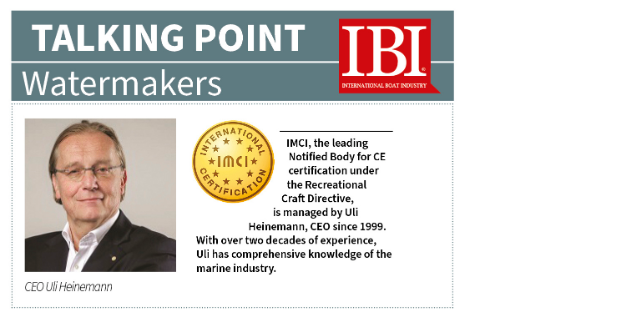TALKING POINT on IBI
WatermakersNot so long ago, salt water treatment systems on board watercraft were pure luxury. After all, it is more than appealing to have fresh water available in large quantities for all conceivable purposes in an environment dominated by salt water. The independence from port-side drinking water is also an advantage. However, in most cases the facilities were only to be found on high-priced, large yachts, which naturally could provide the necessary space and supply energy.
However, the water purifiers were space-consuming, prone to faults, in great need of care and extremely energy-consuming.
That is history. The systems have now shrunk to small dimensions and are affordable. They require considerably less operating energy, less maintenance and have become more robust. Apart from the smallest systems that can actually be operated by muscle power, however, all systems require electrical energy to turn seawater into drinking or shower water.
As a result of this trend, watermakers can now be found on boats of less than 24m hull length, which are known to be within the scope of the Recreational Craft Directive 2013/53/EU (RCD) when they are marketed in the EU. The same applies to the United Kingdom under a law with identical content but a different name.
WHAT IS TO BE CONSIDERED?
- If the system is installed in a section of the watercraft that also houses a petrol tank or petrol engine, it must be ignition protected against flammable gases in accordance with the applicable EN ISO 8846 under the RCD.
- It must also comply with EN ISO standards 13297 and/or 10133 in the latest version to ensure correct installation of the system on the electrical system.
- For connection to seawater, the EN ISO 9093 series of standards regulates the quality of the seacocks and through-hull fittings.
- The treatment plant itself does not fall within the scope of the RCD.
However, as an electrically operated device, it is within the scope of other directives. Depending on the design, these may include the Electromagnetic Compatibility Directive 2014/30/EU (EMC), the General Product Safety Directive (GPSD) 2001/95/EC and others.
- It remains to be seen whether an installation also has to or may comply with the revision of the Drinking Water Directive (98/83/EC) which is currently under way.
Good to know that there are no taste directives or standards!

